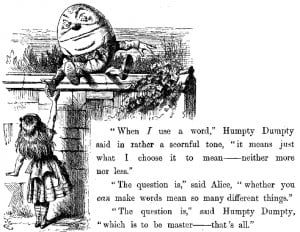

However, in The Annotated Alice, Martin Gardner notes that, when Carroll gave the manuscript for Looking Glass to illustrator John Tenniel, he gave him the choice of drawing a carpenter, a butterfly, or a baronet, since each word would fit the poem's metre. Priestley argued that the figures were political, as does Walter Russell Mead, who utilises the Walrus and the Carpenter as an allegory for the United Kingdom and the United States respectively. Some, including the character Loki in the film Dogma, interpret the Walrus to be a caricature of the Buddha and the Carpenter to be a caricature of Jesus Christ. The characters of the Walrus and the Carpenter have been interpreted many ways both in literary criticism and popular culture. After a pause, Alice began, "Well! They were both very unpleasant characters-" "But he ate as many as he could get," said Tweedledum. "Then I like the Carpenter best-if he didn't eat so many as the Walrus." "You see he held his handkerchief in front, so that the Carpenter couldn't count how many he took: contrariwise." "He ate more than the Carpenter, though," said Tweedledee. "I like the Walrus best," said Alice: "because you see he was a little sorry for the poor oysters." After hearing the poem, the good-natured Alice attempts to determine which of the two leading characters might be the more sympathetic, but is thwarted by the twins' further interpretation: The Walrus expresses some compunction towards the oysters but eats them anyway, while the Carpenter dispassionately asks for more bread and complains that the butter is spread too thickly. After bringing bread, pepper, and vinegar the Walrus and the Carpenter are revealed to be predatory and eat all of the oysters. After walking along the beach (a point is made of the fact that the oysters are all neatly shod despite having no feet), they rest on a low rock.

To the disapproval of the eldest oyster, many more follow them. Groups of four are called up the exact number is unknown. Walking upon a beach one night when both sun and moon are visible, the Walrus and Carpenter come upon an offshore bed of oysters.

The Walrus and the Carpenter are the eponymous characters in the poem, which Tweedledum and Tweedledee recite to Alice.


 0 kommentar(er)
0 kommentar(er)
